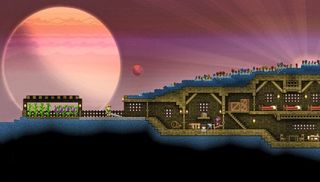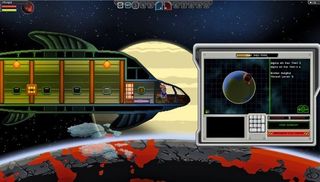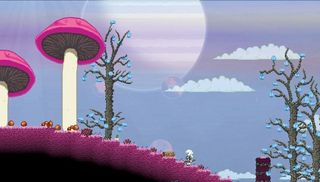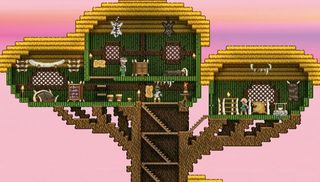Starbound: an ambitious 2D sandbox game set in a procedurally generated infinite universe

Is it actually like Terraria in space?” I'm talking to Finn 'Tiy' Brice, lead developer on Starbound – a game habitually described as 'Terraria in space' and which shares some of the same development team.
“I guess that description is a little misleading, because when you play the game it doesn't feel at all like Terraria. There's a massive emphasis on the atmosphere, the combat is very different, and the building is entirely different,” says Brice. 'Terraria in space' is a handy basiclevel explanation but not an accurate description, he adds.
So that's what Starbound isn't. What it is is an ambitious 2D sandbox game set in a procedurallygenerated infinite universe. In addition to the sandbox elements, there will be a main storyline that will alter depending on which race you play, as well as a slew of side quests and the potential for co-operative multiplayer as well as PvP.

“[Starbound] starts with each of the races you can play as either fleeing or choosing to leave their home planet for some reason,” explains Brice of the main story. “Through the course of the story they'll come together, and I think all of their futures somewhat intertwine.” But the idea of being forced to leave your homeworld at the beginning of a game seems at odds with Brice's insistence that Starbound be as lovable as possible.
“A lack of charm is one of the saddest things plaguing videogames,” he says. As a result, the team are focusing on making Starbound as charming as is humanly possible. “We've put a huge amount of effort into that. It tends to be the smallest things that create the most charm – smoke swirling off the top of teacups or leaves falling from trees.” So how does that marry up with the displaced people?
“Tonally, there is actually quite a bit of contrast there. Obviously the art style is quite friendly to look at, and a lot of the time while you're playing it's pretty friendly – especially in the peaceful parts of the game – but the story is quite dark and quite adult as well,” he says. “We didn't want it to be something Mario-style, where it's great in its own way but there's not much depth. We wanted something people could really sink their teeth into.”

Despite not having the main story fully fleshed out yet (it won't even be in the open beta when that launches later in 2013), the Starbound team are already thinking about how to integrate DLC. One of the ideas is a paid-for season of content that operates like a television series. “Once you pay for it, you get a new episode every week on the same day at the same time,” says Brice. “We want to turn, say, Thursday nights at 6pm into Starbound night, and create cliffhangers that people can discuss between episodes and the end of a season.”
PC Gamer Newsletter
Sign up to get the best content of the week, and great gaming deals, as picked by the editors.
As much as it will contain narrative, a massive part of Starbound will be rooted in exploration and discovery. One result is that the developers are aiming to give the player an “almost unlimited” number of things to find. It's this need for an abundance of objects that should also make the game mod-friendly.
“The amount of content had to be so high that relying on a small group of programmers to do it all was just not feasible. What we did was set up the engine in such a way that even artists who had never touched code in their lives could add new objects and new monsters or guns or armour in five minutes. It's that simple. There are going to be different levels of modding [but] just adding content is absurdly easy. Anyone with Notepad and Paint can just draw a chair or something and add it to their game.”

As well as this vast, moddable object library, procedural generation is being used for content from guns to landscapes so new worlds and experiences should always be possible to find. The emphasis is on creating opportunities for the unexpected, although sometimes the actions of the dev team can have a similar effect.
“We have a physics system we can apply to blocks,” says Brice when asked whether anything unexpected has happened to him in the game. “Sand cascades and forms into big piles, and water reacts like liquid. One of the guys on our beta team built a huge sandcastle fortress thing; I wasn't aware, but after he'd built it I added the cascading physics to the sand block. He loaded up his game and said to me, 'Come visit my big sand fortress thing!' We joined his planet and the whole thing fell down.” A once-mighty fortress turned to sand soup. “I think it was sad for him and funny for me.”
The experience reminds Brice of playing Minecraft, accidentally setting parts of his home alight when building a fireplace. “I like seeing things like that happen, even if it happens to me – at least I didn't expect it, and anything unexpected is great,” he says. “That's what Starbound is about really.” He pauses. “There probably won't be experiences that burn the player's house down, though.”
Most Popular


